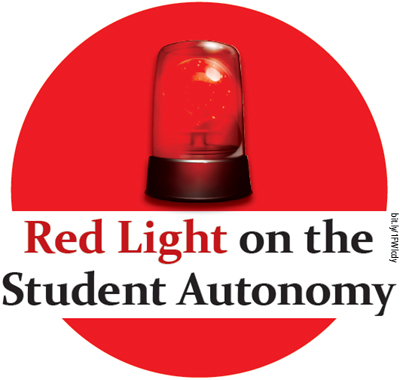
| The Student Council have a duty to speak on behalf of the students as their representative. They take responsibility for students’ welfare and convenience, and their job ranges from “Yasikhaengsa of love” to the organization of important events at the school such as festivals. It is necessary to mention that dysfunction or conflicts within the Council directly affect campus life. To avoid such crises, communication and collaboration are important, but the previous Student Councils were disappointing in their performances. At the doorstep of 2015, we should examine past mistakes and look forward to planning better future. |
Failing Empathy Plus
The last year’s Student Council, Empathy Plus, underwent a series of conflicts among the members which eventually resulted in a total division. The trouble sparked from the first annual event held in February, Freshmen Orientation, during which the former president of the Council, Choi Won-jun (Dept. of Landscape Architecture, ’09), and the executive branches constantly failed to come to an agreement. Unresolved of the issues, Choi decided to resign from his duty after a consideration around June. The turmoil looked as if it had ended with his decision at the time.
The matter, however, came back to square one again. It started with Choi’s withdrawal of resignation. Through Gwangjang, the UOS community, Choi indicated the reason of his overturn: “I had decided to resign to maintain the Student Council. Then, I went to do volunteer activity in rural communities. Afterwards, I changed my decision. A lot went through my mind after working together with the UOS students. I did not want to evade my responsibility as the president of the Student Council. I wanted to complete responsibility. I thought we could solve the conflict among us somehow.” Some directors of executive branches, however, expressed discontent since the resignation had been decided among them.
The former director of planning, Kim Dong-gyu (School of Economics, ’12), explained how the rest of the Council felt when the president made such an announcement: “By only saying ‘A lot went through my mind…,’ he overturned the result of our serious discussion which went on for hours, and by saying ‘we were all not rational at the time,’ he regarded our serious discussion as of no significance.” Despite these voices of distrust, the rest of the Student Council accepted Choi’s determination because he held power as the acting president of UOS elected by the students.
Besides, there was the same improper history1 in the 2013’s Student Council which made the upset directors intimidated about having a consecutive uproar within the Council. “Restarted” Empathy Plus, however, did not get the chance to make their relationship better. Bibigo, 2015 UOS festival which integrates Daedongjae, Inhyangjae, and Jeonongchejeon2, started soon after the Council’s renew. The festival was prepared independently from the Student Council, and as some of the executive members of the Council took part in the planning of Bibigo, the business of the Council was brushed aside.
The members of the executive branches did not attend the meetings of the Student Council occasionally and failed to stay in the office to attend to students’ needs during their working hour. For this abandonment of duty, there was a hole in the job of the Student Council. Choi made up his mind to fire those members: “I cannot tolerate it anymore, for they left the earnest with a bigger workload.” The fired members, however, constantly argued that these dismissals were unfair; the “meeting” in which Choi decided to remove the members of executive branches was not notified before it was held, and the standard of removal was not applied equally to all members. Moreover, they purported that Choi also failed to fulfill his duties as well. Choi replied that the blame should be on those who were removed for not coming to the regular meetings and added that he used the fairest standard for dismissal.
The conflict reached a climax when the fired directors of executive branches and the former vice-president, Jung Tae-hwan (Dept. of Electrical and Computer Engineering, ’09), issued the impeachment of Choi with the signatures of agreement from 500 UOS students. At the Impeachment Assembly held on Dec. 4, 2014, Jung said, “If the impeachment passes through, my status as the vice-president would also come to an end. However, to share the blame with Choi, I have decided to take action, at the risk of losing my status.” Choi apologized to the audience for causing inconvenience and promised to complete the handover to the future Student Council without making further problems, regardless of what happens.
Nonetheless, far less than one tenth of the whole UOS student body attended the assembly: 59 students. As a result, the Impeachment Assembly failed to meet the quorum and could not even be put to a vote. After all these events, the result was very disappointing since the problem was unsolved, and could not be even discussed. It is high time that we should pinpoint our current condition.
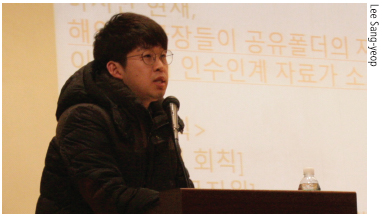
Damages of Lacking Empathy, Gonggam
Because of continuous collisions within Empathy Plus, not only pledges but also the work of the Student Council did not function properly. For causing considerable inconveniences, many UOS students expressed their dissatisfaction with the Student Council. Three major mistakes the former Council made are as follows:
Breaking Campaign Promises
Empathy Plus initially made 15 promises during the campaign, including four major ones: Smart ID Card, Sidaeyeojido, Private Tutor Union, and participation in the Committee of Spatial Coordination. Among these 15, only six were executed, and none of the major four promises were fulfilled during its term. Regarding Smart ID Card business which could have been carried out within his term, Choi excused himself by saying that it had been planned for a long run business in an interview with the UOS College News. However, Close-up, the 2015 Student Council, is not obliged to do anything out of its plans to continue the businesses of the previous Council, for it only has a year to keep its own promises to the UOS students.
In addition to this, the Free Printing promise which was evaluated as the most practical and satisfying project that Empathy Plus had, was also difficult to be carried out since there was no workers to provide the service in the Student Council’s office.
|
Neglecting obligations as the Student Council
Last year’s festival, Bibigo, was one of the main annual businesses that the Student Council worked on, brought many inconveniences to UOS students in the process. In 2014, different from the previous years, the event was planned by several independent groups, not by the Student Council. However, some members in the executive branches of the Student Council participated in the planning of Bibigo, and the duty of the Student Council was put aside.
Concerning such a temporally abnormal division of work, Choi said via Gwangjang, “The reason for making the independent Planning Group is to minimize the potential conflict between two different group s[the Student Council and the Club Union]. The Bibigo Planning Group stands independently, and both the Student Council and the Club Union support the Festival. This may sound like a joke.” He believed that creating an independent Planning Group would turn out to be an advantage for the festival.
Even though he had a good purpose, there still seemed to be doubts; Why is it that the group was constituted without the members of the Student Council?; If not, why should the Council set it as the independent group which would result in doubled workload?; Or, was it just an excuse to redirect the responsibility? In addition to this, Empathy Plus originally promised to give out official note of absence to any students who missed their classes to help with the operation of Bibigo or to participate in the official festival events, but they could not because of discordance with the Student Service Center. Disadvantaged in classes, students demanded that Empathy Plus provide an explanation. They only responded that, however, the matter belongs to the Planning Group, not the Student Council.
Interrupting the process of handover
The prolonged conflict within Empathy Plus that grew into issuing impeachment made a handover almost impossible for the 2015 Student Council. The directors who were supposed to pass over the work of the Student Council to next year’s members lost their formal duties, because they had already been fired. Choi was blocked out from his status temporarily (or permanently) by the impeachment. Although Choi reassured the audience by affirming he would do his best to carry out the handover as smoothly as possible at the Central Executive Committee, but the other directors expressed their doubts.
However, it turned out that he did not make practical efforts after his verbal promise to persuade the fired directors to hand over their work to the new Council. Some of them showed their willingness to take part in the handover process even in person for the future Student Council; However, they “did not receive any sort of proposition from Choi.” In the Impeachment Assembly held in last November, a UOS student asked Choi if he had a detailed plan to complete the handover. He replied it was now the job of the Transition Committee, adding that there was no problem in terms of paper work anyway.
When The UOS Times asked Close-up how the handover went, the answer was quite interesting; As Choi’s impeachment progressed, the Transition Committee attempted to deal with the empty spot. The president of College of Humanities at the time, Cho Chang-hoon (Dept. of Philosophy, ’10), was elected as the chairman of the Committee. He later became the 2015 president of the Student Council. Because he was already familiar with the job of the Student Council, every step of the handover process was not necessary, and Close-up could start its session with no big difficulties.
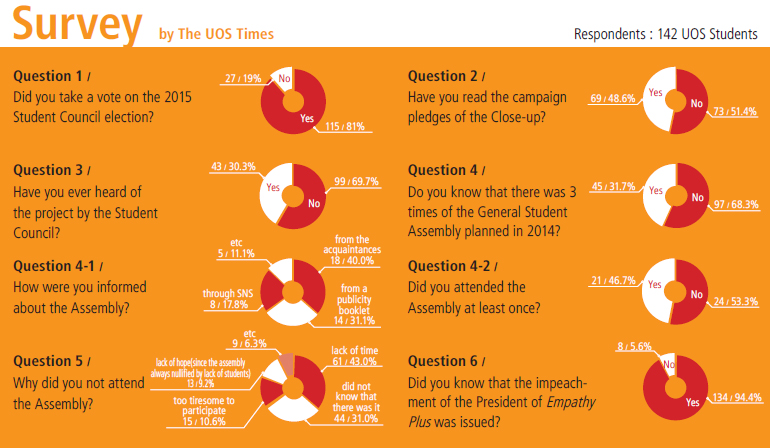
System Inspection
While working as a team in the Student Council, the members continued to have small conflicts among themselves. In fact, what worsens the tension within the Council is in the system itself.
Problems in appointing and dismissal
A critical error which was against the common sense of democracy was evident in the dismissal process of members of executive branches. The purpose of the meeting was not announced in advance, so not all of the members, including those who already did not attend regular meetings, could join the meeting, which is not appropriate when discussing the dismissal.
Even though the removal of some members was decided because of the damage that the members had done, there was no announcement about this decision to UOS students. However, we cannot criticize Choi alone. He had a problem with his coworkers, which even brought about the impeachment, but no rules were violated. UOS General Student Regulation Article 5 Clause 1 Section 45 Subsection 3 regarding authority states that “The president of the Student Council can appoint and dismiss members of executive branches according to regulations and detailed rules.” Accordingly, the president is in full control over the personnel management of the Council. The part of the statement “according to regulations and detailed rules” is not clear because we cannot find out which part it indicates. Since there is no manual for the dismissal process, it becomes arbitrary, ultimately leading to the presidential abuse of authority.
Whether the fair criteria had applied to the dismissal process, the fired members had to leave the Student Council without a reasonable procedure. Therefore, the Council should now establish a proper manual for appointing and dismissal. The current way of empowering the president can lead to an undemocratic way of dismissal. Therefore, adequate procedures should be adopted like voting or at least having a meeting about dismissal.
Absence of proper restriction
There is no system to prevent the members or the president of the Council from abandoning their obligations. As Choi said himself, not even a single line in the UOS Regulation enforces admonitory measures. The only method to stop negligence of duties is removal for the members and the impeachment for the president. Thus, although the procedure was wrong, it is officially plausible that Choi fired those members who did not work hard to maintain the Student Council. The Student Council is the representative of all the UOS students. Considering the gravity of its duty, it should be under constant observation to direct its actions to the right path.
Cho, the president of Close-up, however, worries that any kind of restriction might foster the struggles between the members. However, a significant student organization such as the Student Council cannot merely depend on conscience and a personal sense of responsibility for pursuing their job. Rules have a purpose of prevention, as well as punishment. Since the former Councils failed to pursue their obligations, Close-up now needs to show visible actions to build up trust among UOS students.
Unbalanced role of Inspection Committee
Generally, the Inspection Committee has two roles: The audit inspection of the budget and its overall use, and the business inspection judging of the operation of group. Currently, the Inspection Committee of UOS focuses only on the audit inspection. The Inspection Committee of UOS conducts inspection twice a year, when semester begins, on the budget allocated to every student organization branch at UOS. In addition to that, it also functions as the Impeachment Inspection Committee when impeachment is issued.
Except for these two jobs, the Inspection Committee at UOS does not play a role in business inspection. If the Inspection Committee had monitored the business of the Council regularly last year, the problem would not have come to an actual outbreak of accumulated struggles within the Council. Unfortunately, the regulations stating the Committee’s right to investigate are too ambiguous that it cannot do its job without the report from an outside source. If the Student Council is the executive of UOS, then the Inspection Committee is the judiciary. The right of the Inspection Committee should be reinforced by the amendment of UOS Regulations to set the balance to prevent monopoly of power.
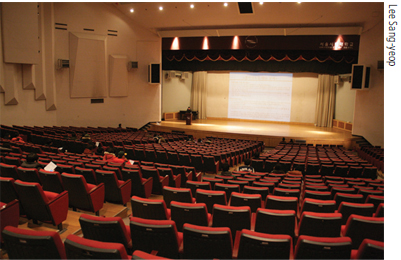
The General Student Assembly is the most important autonomic legislative meeting that anyone at UOS can attend. The Assembly is held once a semester, primarily to discuss the agenda that the Student Council suggests or students propose. In the Assembly, the amendments of the UOS Regulation can be discussed. The agenda discussed in the Assembly is put to a vote. The General Student Assembly is where the most direct democracy takes place. Students who do not belong to any council can get the correct information about overall management of UOS, and can express their opinions most directly. Unfortunately, no Assemblies took place last year. According to UOS Regulation Article 3 Section 19 Subsection 1, at least one tenth of the UOS students should attend the Assembly to hold the meeting. Without the sufficient number, the Assemblies are nullified, like they were last year.
Let us do a systematic analysis about the shortage in the number of attendants. According to the research that The UOS Times conducted, many other colleges also have same rule about it: from Ewha Womans University which is a similar in size to UOS to Seoul National University which has 10 thousand more students than UOS. The requirement for a thousand at UOS does not seem too much. The problem is , however, how the students participate. Including the Impeachment Assembly, the Assemblies of the last year were all scheduled to begin at 5 to 6 p.m. on weekdays. Because at that time on weekdays, many students took classes or went for dinner right after class, they chose not to come to the Assemblies. Also, the assembly could not be held on weekend since there are not many students on campus. They did not even want to come to just for the Assembly. Therefore, applying a strict attendance rule makes it impossible to open the Assembly.
As aforementioned, the Student Council is not the only reason for the repeating cancellations of the Assembly. Naturally, when the problem occurs, an outright effort to set the wrong situation straight can make the change. However, UOS students did not even try to make such an effort.
Questions 2 and 3 of the survey conducted by The UOS Times give a glimpse into the level of attention toward Close-up. Although 84 percent of respondents answered that they voted in the election of the new Student Council, about half of them did not read the election pledges. On questions through 4 to 6, about 70 percent of the respondents also answered that they were not even aware of the businesses of the previous Council, Empathy Plus. There were 45 students out of 142 who knew that the General Student Assembly took place three times last year, and only 21 actually attended it.
Even if problems arise, they cannot be solved easily due to a lack of student participation. Cho, the president of Close-up, said, “As far as I know, there was a growing demand for amendment of regulations over the years, but we have no choice but to use the old ones since there has been no valid General Student Assembly.” At the General Assembly, the agendas like amendments and events are discussed along with the report by the Student Council on the progress of its businesses. Unfortunately, the assembly has not been held for a long time, and no attempts have been even made to improve the situation and put an end to the vicious cycle.
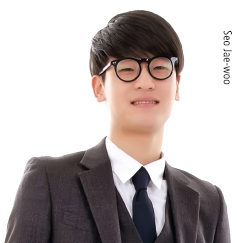
 How many students attend the General Student Assembly?
How many students attend the General Student Assembly? To hold a valid General Student Assembly, one tenth of the students [for KU it is about 2,000 students, and for UOS it is 900] should attend. Since there are difficulties to meet the requirement, KU established the General Student Representative Conference instead. A recent case shows 90 percent of the members are now attending it.
To hold a valid General Student Assembly, one tenth of the students [for KU it is about 2,000 students, and for UOS it is 900] should attend. Since there are difficulties to meet the requirement, KU established the General Student Representative Conference instead. A recent case shows 90 percent of the members are now attending it. Do you think that the students at KU show more interest in the Student Council especially when they have internal or external problems or conflicts?
Do you think that the students at KU show more interest in the Student Council especially when they have internal or external problems or conflicts? I believe there is not a big increase, but students of KU has been showing a constant interest in giving feedbacks to the Student Council on the outlook of its plans and policies.
I believe there is not a big increase, but students of KU has been showing a constant interest in giving feedbacks to the Student Council on the outlook of its plans and policies. Have you had a case that students’ interest ever actually solved problem?
Have you had a case that students’ interest ever actually solved problem? KU has recently tried to change students’ space for the excuse of remodeling. However, with the help of many students, the space was secured even after the remodeling.
KU has recently tried to change students’ space for the excuse of remodeling. However, with the help of many students, the space was secured even after the remodeling. Any last remark on the low participation rate of UOS students?
Any last remark on the low participation rate of UOS students? A decreasing amount of students’ interest and participation has not been a new problem only to KU and UOS. To solve this problem, student representatives ranging from the Student Council to Student Councils of each college and department should more actively encourage students’ participation. In addition, we should explain to students the reason for all the discussions and assemblies, instead of blindly asking students to cooperate
A decreasing amount of students’ interest and participation has not been a new problem only to KU and UOS. To solve this problem, student representatives ranging from the Student Council to Student Councils of each college and department should more actively encourage students’ participation. In addition, we should explain to students the reason for all the discussions and assemblies, instead of blindly asking students to cooperate
Efforts to Close-Up to You
To make the campus life comfortable, students’ participation is important. Not only UOS, but also KU which is evaluated as a good example of student autonomy suffers from it. If it is so, what measures has Close-up come up with to induce students’ interest and participation?
The UOS Times asked the current president Cho about the solution for such a problem. He replied that a variety of suggestions have been steadily made: advertising online via Gwangjang and Facebook, putting up posters, visiting students during their classes, etc. “It is no longer important to present ideas; It is the time for the Student Council to efficiently carry out those ideas, and students also have to change their attitude and appreciate the effort of the Student Council.”
By far, the efforts the Student Council has made to approach students do not seem to be enough. All three General Student Assemblies that were held last year did not reach the quorum. Close-up has, however, made some revisions on the detailed rules about advancing the General Student Assembly. Before revision, 10 percent of the entire student population was required to attend the assembly to begin a session.
The revised regulation allows the assembly to take place with the attendance of 4% of students and the written agreements from 6% of students. This way, students can possibly have more chances to have their ideas and opinions reflected in the work process, if the assembly turned out to be held. When Cho was asked if he had a backup plan when the General Assembly failed to be held after these attempts, he answered rather carefully. “The General Student Assembly is the top legislative organization which represents the student body. In the case of KU, the General Student Representative Assembly has been created with authority from the General Student Assembly. The board of student representatives at UOS is very similar to it. Nevertheless, this is indirect democracy while the General Student Assembly is direct democracy, so I find it difficult to claim indirect democracy as an alternative.”
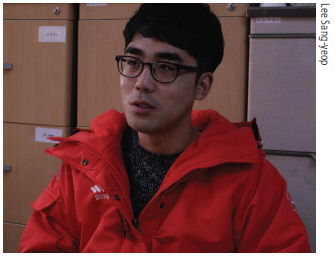
Behind all the processes from dismissing the directors of the executive branches to issuing impeachment, both the dismissed directors and the president of the last year’s council Choi showed negligence of duty to some extent. The directors were at fault because they did not fulfill their duties, but Choi was not free from blame, either.
Regarding this, the current president Cho said both sides were at fault: “President should accept and consider all the needs of members and directors. They should endeavor to consider the opposite point of view at all times.” However, when asked about actual measures to deal with conflicts among the members, he did not give a clear answer. He only answered that tension among the members could be prevented by drawing a line between public and private matters, implying that by communicating and getting to know each other, disputes can be dissolved.
Students want the Council to build up clear and concrete pledges and carry out them. Vague ideas that Cho suggested might not be able to induce the public’s trust. Working in the Council is not like joining a club; the Council should take a responsibility to take care of thousands of students’ campus lives. Students will expect Close-up to do more than letting it just go when a struggle actually occurs.
The UOS Times has spotlighted the unreasonable system which lay behind the Student Council, here. It turns out that the regulations are too ambiguous that is open to any interpretations, lacking the equality and balance. With all these problems, the system cannot be corrected without students’ exertion of sovereignty. The importance of the proper Student Council cannot be stressed enough. Without it, the democracy that we have maintained would fall down like the house of the cards. As the president Cho promised to make this year a revival of student autonomy, the causes of the last year’s should be changed to protect our democratic right as students. Above all, however, students’ participation should be prioritized. With no students, there will not be autonomy. Without their participation, we cannot make a difference.
Lee Sang-yeop syl0616@uos.ac.kr
Moon Han-sol alicemoon94@uos.ac.kr

